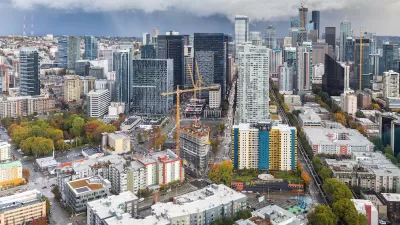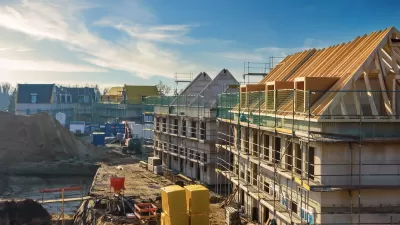An increase in fees for commercial construction projects is raising concerns from local developers who say the industry already faces rising costs to build in the city.

Pittsburgh developers are calling an increase in zoning review fees for commercial properties “egregious and excessive” and an “unreasonable burden” that is driving up the cost of building in the city, reports Mark Belko for the Pittsburgh Post-Gazette.
According to Brandon Mendoza, executive director of an association representing developers and other real estate professionals, the new fee of $3 per $1,000 of commercial project “amounts to a twenty-fold increase over what developers were charged last year for the same zoning review.” Developers argue the new fees will have a chilling effect on construction in the city, drive builders away, and undermine efforts to boost affordable housing production. Belko notes that fees for residential permits are $1 per $1,000 of project, “not as hefty as for commercial but still substantial.”
Some developers argue the new fee schedule is “borderline illegal” because “Pennsylvania law does not allow municipalities to use their power to charge fees ‘for issuing licenses or permits for the purpose of raising revenue.’” A lawyer for Walnut Capital said any fees above and beyond the costs associated with issuing the permit are an “unauthorized tax” and not permitted by state law. Developers are asking the city to suspend and review the new fee schedule.
FULL STORY: ‘Bordering on illegal’: Pittsburgh’s new zoning review fees draw wrath from developers

Alabama: Trump Terminates Settlements for Black Communities Harmed By Raw Sewage
Trump deemed the landmark civil rights agreement “illegal DEI and environmental justice policy.”

Planetizen Federal Action Tracker
A weekly monitor of how Trump’s orders and actions are impacting planners and planning in America.

Why Should We Subsidize Public Transportation?
Many public transit agencies face financial stress due to rising costs, declining fare revenue, and declining subsidies. Transit advocates must provide a strong business case for increasing public transit funding.

Understanding Road Diets
An explainer from Momentum highlights the advantages of reducing vehicle lanes in favor of more bike, transit, and pedestrian infrastructure.

New California Law Regulates Warehouse Pollution
A new law tightens building and emissions regulations for large distribution warehouses to mitigate air pollution and traffic in surrounding communities.

Phoenix Announces Opening Date for Light Rail Extension
The South Central extension will connect South Phoenix to downtown and other major hubs starting on June 7.
Urban Design for Planners 1: Software Tools
This six-course series explores essential urban design concepts using open source software and equips planners with the tools they need to participate fully in the urban design process.
Planning for Universal Design
Learn the tools for implementing Universal Design in planning regulations.
Caltrans
Smith Gee Studio
Institute for Housing and Urban Development Studies (IHS)
City of Grandview
Harvard GSD Executive Education
Toledo-Lucas County Plan Commissions
Salt Lake City
NYU Wagner Graduate School of Public Service





























